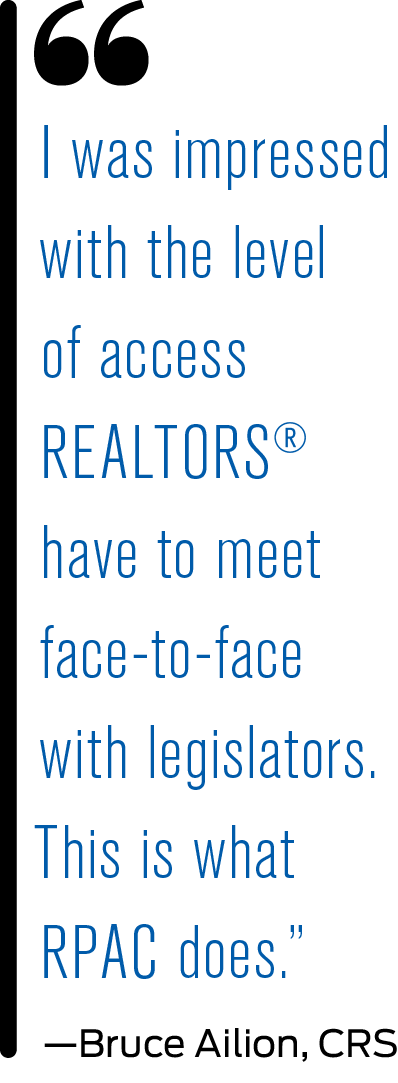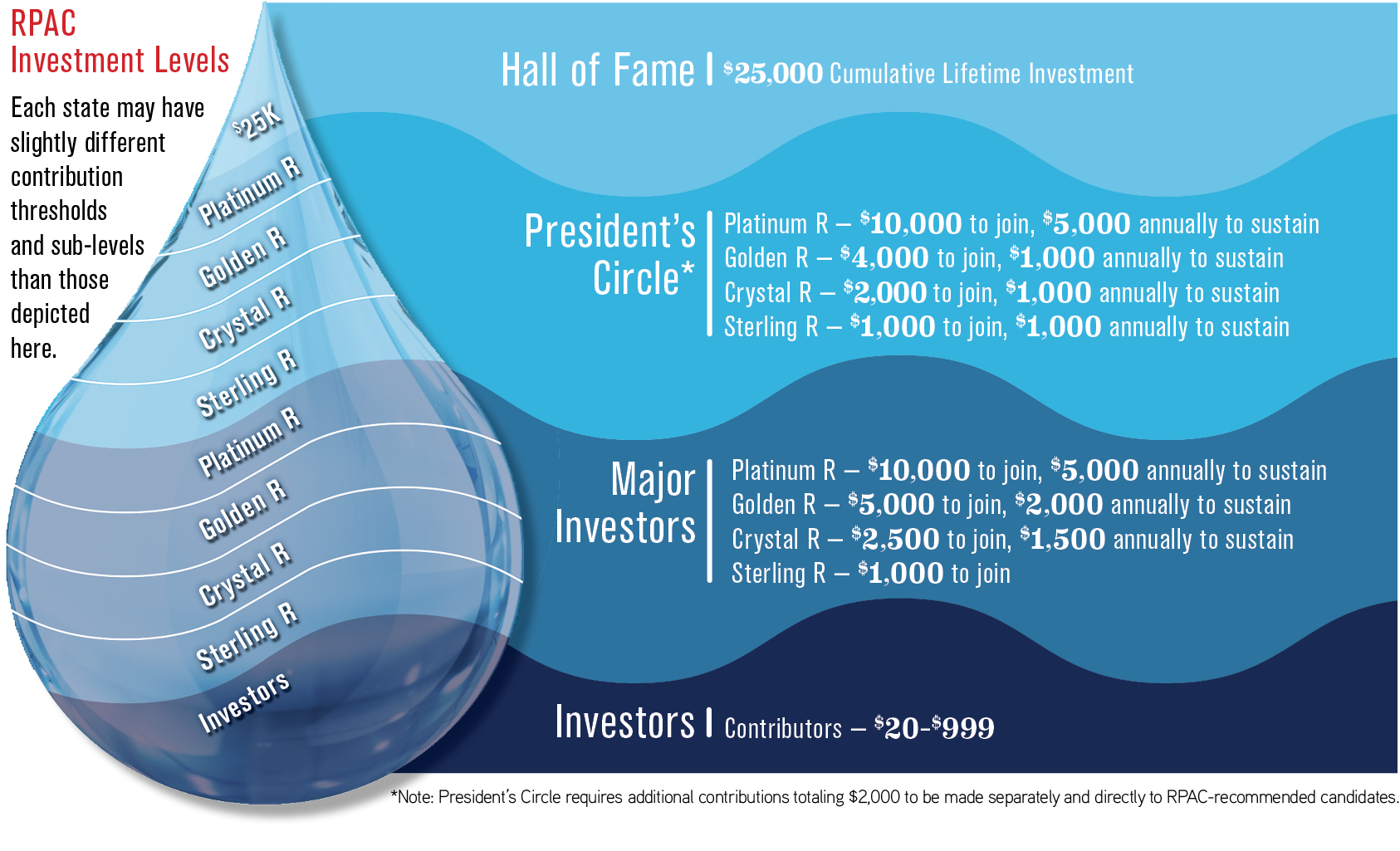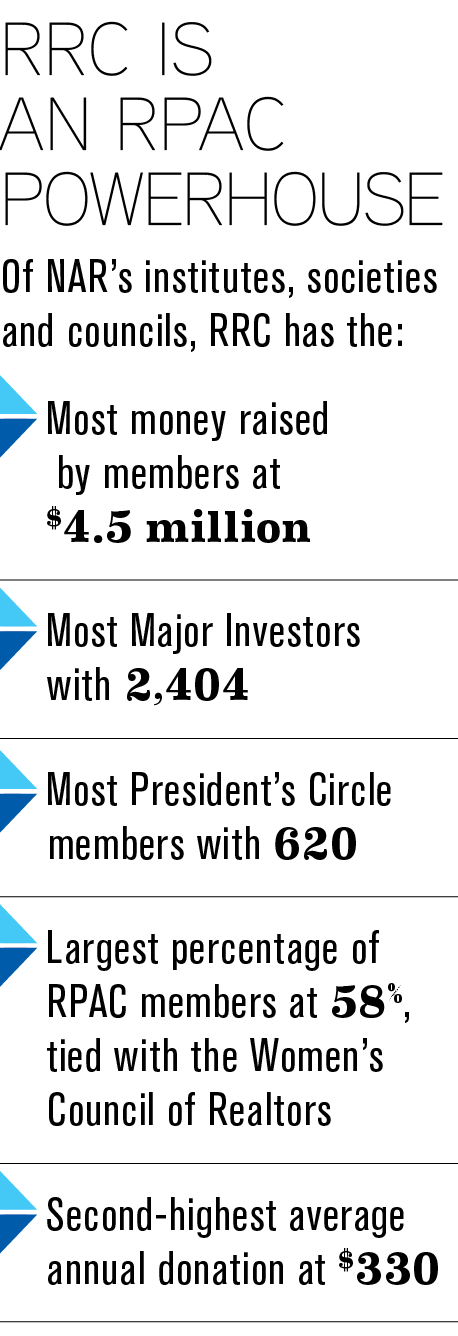CRSs are able to make their voices heard in the political realm by donating and getting involved with RPAC
By Michelle Huffman
“If you’re not at the table, you’re on the menu.” Members of the REALTORS® Political Action Committee (RPAC) are probably familiar with this phrase.
It’s an oft-repeated and lighthearted way to highlight RPAC’s role for real estate agents.
“l know firsthand that elected officials listen to their constituency, and if they aren’t listening to us, then they’re listening to somebody else,” says Maurice Taylor, CRS, with Coldwell Banker RPM Group, and a city council member in North Little Rock, Arkansas. “We want to be at that table, so they hear everything we have to say.”
What is RPAC, and what issues does it support?
“RPAC is the voice of REALTORS® in local, state and national political discussions and decisions that impact our industry and property rights,” says Bruce Ailion, CRS, with RE/MAX Town and Country in Alpharetta, Georgia.
There are also several groups within RPAC, which denote different levels of means of involvement.
Major Investor: An elite and passionate group of REALTORS® who invest at least $1,000 annually. They are entitled to certain benefits and accolades.
President’s Circle: A group of REALTORS® who contribute directly to RPAC-identified REALTOR®-friendly candidates at the federal level. Members of this group are invited to an exclusive three-day conference where most expenses are covered.
Hall of Fame: Dedicated members who have donated an aggregate lifetime amount of at least $25,000. They receive a plaque on the National Association of REALTORS® Washington, D.C. building, among other benefits and accolades. There are approximately 1,605 Hall of Fame members.
 As a political action committee, RPAC privately raises and pools money to impact elections or legislation. Taylor, who is a Major Investor and member of the President’s Circle and Hall of Fame, compares RPAC to having a doctor or lawyer. These individuals are experts in their professional fields, and they keep abreast of the latest developments, so they can inform you when you need specialized knowledge.
As a political action committee, RPAC privately raises and pools money to impact elections or legislation. Taylor, who is a Major Investor and member of the President’s Circle and Hall of Fame, compares RPAC to having a doctor or lawyer. These individuals are experts in their professional fields, and they keep abreast of the latest developments, so they can inform you when you need specialized knowledge.
“I don’t keep up with new legal issues. That’s what my lawyer is for,” he says. “And while I know enough to keep myself healthy, I don’t keep track of all the advancements in medicine. That’s my doctor’s job.”
Members of RPAC have specialized real estate knowledge and can use that to keep elected officials better informed of the issues. And importantly, it’s not just the real estate industry RPAC advocates for, but also homeowners and their communities. The issues RPAC has undertaken are wide-ranging and highly impactful.
Some of the issues RPAC works on include federal flood insurance, mortgage interest deduction, capital gains taxation, depreciation schedules, disaster relief and fair housing, says Ailion, who is a Major Investor and member of the President’s Circle and Hall of Fame.
Paul Yorkis, CRS, with Patriot Real Estate in Medway, Massachusetts, Major Investor and member of the Hall of Fame, says being able to advocate for legislation that helps facilitate first-time homeownership is also a major point of pride.
“Most recently, we’ve been working as an association with members of Congress to ensure they understand the importance of housing for that missing middle class, the blue-collar worker, the first-time homebuyer,” he says. “We’ve also been very strong advocates for reform as it relates to federal financial aid policy. We want Congress to understand the impact of student loans on individuals’ and families’ ability to purchase a home.”
Recently, as the COVID-19 pandemic unfolded in 2020, RPAC members were talking with elected officials at the state and local levels to ensure real estate was considered an essential business, and that 1099 workers could apply for unemployment and qualify for PPP loans, Taylor says.
“All that was huge,” he says. “If that wouldn’t have happened, the number of people that would not be in this business right now is unimaginable.”

What are the benefits of being involved in RPAC?
There are multiple benefits to donating to RPAC and to becoming a Major Investor, members say.
For starters: “I was impressed with the level of access REALTORS® have to meet face-to-face with legislators. This is what RPAC does,” Ailion says.
Taylor, for instance, says he’s become the go-to information source for all things real estate for his state representative. When she needs to understand a real estate-related issue, she calls or sends him an email. The ability to inform legislators face-to-face and build relationships with them is something Yorkis really enjoys.
 “I am fortunate—and I mean this very seriously—to be friends with several members of Congress,” he says. “They know when I am advocating for something that it is not a personal ask. It is a professional ask for my community or my profession or my state or my country.”
“I am fortunate—and I mean this very seriously—to be friends with several members of Congress,” he says. “They know when I am advocating for something that it is not a personal ask. It is a professional ask for my community or my profession or my state or my country.”
Morris Lyles, CRS, with ERA Wilder Realty in Columbia, South Carolina, is also appreciative of being in the know on what’s happening, and how he can use that to inform his business and his clients.
“We’re on the forefront of what’s happening—if a new industry is coming in or new regulations are proposed, we know about it,” says Lyles, who is a Major Investor, President’s Circle member and past chair of South Carolina Association’s RPAC Trustees.
And then, of course, there’s the networking opportunities.
“Members support members who understand the value of RPAC,” Ailion says. “For example, I refer to RPAC Major Investors, and in 2022, I have already closed two referrals from RPAC members.”
RPAC Major Investor status is so important to so many CRSs, it’s also denoted on CRS Designees’ online profiles and is a filter CRSs can use when making referrals through the Find a CRS platform.
Lyles says it’s no wonder that so many CRSs are also involved with RPAC.
“I was at the President’s Circle conference in the Bahamas, and a lot of other CRSs were there,” he says. “That just shows how if they understand enough about the industry to become a CRS, they understand how important it is to contribute to RPAC.”
For more information and to get involved, visit NAR.realtor/rpac.
Photo: iStock.com/wundervisuals








